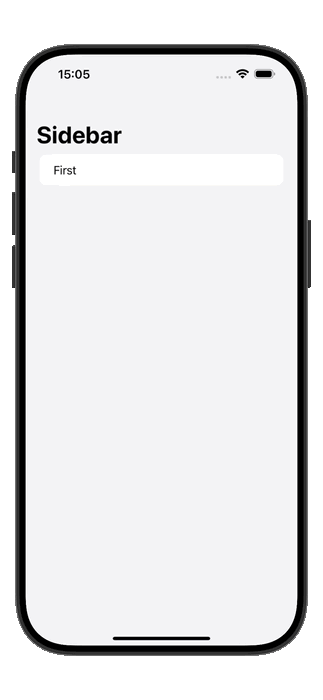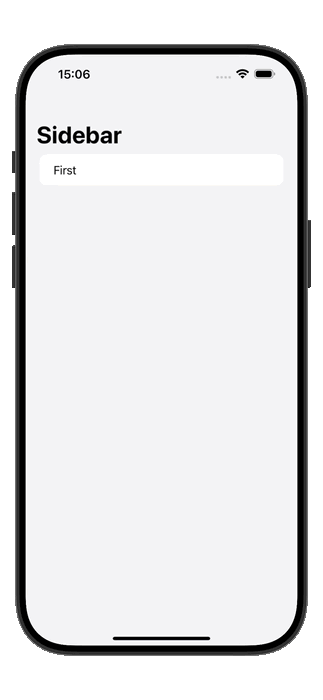I lately ran into some weird behavior with NavigationSplitView. The issue happens when using it with a NavigationStack in the detail view to add one more level of “drill down.”
To have full control over column display, I used two properties in the NavigationSplitView init:
NavigationSplitView(
columnVisibility: NavigationSplitViewVisibility,
preferredCompactColumn: NavigationSplitViewColumn
)Here’s what I wanted my users to do:
- Select something on the sidebar
- Choose an item from the content view
- On the detail page, either drill down further or go back to sidebar by tapping a
resetbutton
Here’s my code:
struct ContentView: View {
@State var navigationPath = NavigationPath()
@State var preferredColumn: NavigationSplitViewColumn = .sidebar
@State var columnVisibility: NavigationSplitViewVisibility = .all
var body: some View {
NavigationSplitView(
columnVisibility: $columnVisibility,
preferredCompactColumn: $preferredColumn
) {
List {
Text("First").onTapGesture {
preferredColumn = .content
}
}
.navigationTitle("Sidebar")
} content: {
List() {
Text("first content").onTapGesture {
preferredColumn = .detail
}
}.navigationTitle("Content")
} detail: {
NavigationStack(path: $navigationPath) {
VStack {
Text("Detail")
Button("Push") {
navigationPath.append("More Detail")
}
Button("Reset") {
preferredColumn = .sidebar
}
}
.navigationTitle("Detail")
.navigationDestination(for: String.self) { value in
Text(value)
.navigationTitle("More Detail")
}
}
}
}
}Nothing special so far. Let’s look at the video of the behavior:

And now let’s see what happens if the user decides to push on the NavigationStack and hits the reset button afterward.

Did you see it?
For some reason, the programmatic back navigation stopped working!
What happened? Once we pushed a view onto the NavigationStack and tried to change the columnVisibility or preferredCompactColumn, it just ignored us.
The manual back arrow and gesture still work fine though.
Why is this happening?
I’m not 100% sure what’s happening under the hood. After debugging, I found that iOS updates the preferredCompactColumn by itself. This happens when you pop the last view off of the NavigationStack.
The NavigationSplitView seems confused. It thinks this navigation is its own and sets preferredCompactColumn to .content. But it still shows the .detail column on screen!
Even weirder: updating preferredCompactColumn to .detail again doesn’t fix it. Only manually navigating back and forth will reset things.
Why is this an issue?
You might use NavigationSplitView and never hit this problem. If so, lucky you!
But this can be a nasty bug whenever you have multiple sections in your app and want to let users quickly jump between them. I’d also argue that with complex navigation, you’ll naturally want more control over which columns are displayed and will lean towards the columnVisibility and preferredCompactColumn API.
My workaround
There are actually two ways to sail around this issue. The first one is to stick to the selection-based navigation showcased in Apple’s documentation:
struct ContentView: View {
@State private var department: String?
@State private var employee: String?
var body: some View {
NavigationSplitView {
List(["HR", "IT", "Sales"], id: .self, selection: $department) { department in
Text(department)
}
} content: {
Text(department)
List(["Alice", "Bob", "Charlie"], id: .self, selection: $employee) { employee in
Text(employee)
}
} detail: {
VStack {
Button("Reset selection") {
employee = nil
department = nil
}
Text(department)
Text(employee ?? "Nothing Selected")
}
}
}
}This works fine but lacks flexibility. Maybe you don’t have lists in your sidebar or content columns. Or maybe your existing navigation patterns don’t play well with this selection-based approach.
This is where my dirty workaround comes in. I tried everything to fix this elegantly. But only one thing worked: forcing SwiftUI to re-render the whole NavigationSplitView.
I attached an .id(:) to the view that changes before column updates whenever the NavigationPath was modified.
struct ContentView: View {
...
@State var identifier = UUID()
var body: some View {
NavigationSplitView(
columnVisibility: $columnVisibility,
preferredCompactColumn: $preferredColumn
) {
...
} content: {
...
} detail: {
NavigationStack(path: $navigationPath) {
VStack {
...
Button("Push") {
...
}
Button("Reset") {
identifier = UUID()
preferredColumn = .sidebar
}
}
...
}
}
.id(identifier)
}
}While this works, it might cause some UI flickering. So I’m still not completely happy with it.
If there’s one takeaway from this post, it’s this: stick to selection-based navigation for NavigationSplitView when you can make it work with your app architecture. Don’t mess with preferredCompactColumn if you can avoid it. At least until apple fixes this bug. Your future self will thank you!